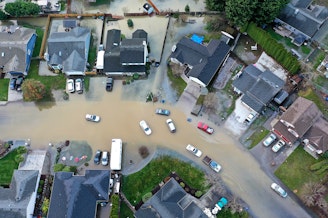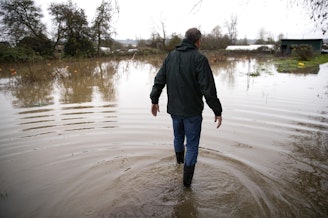Firefighters see danger. These goats see dinner
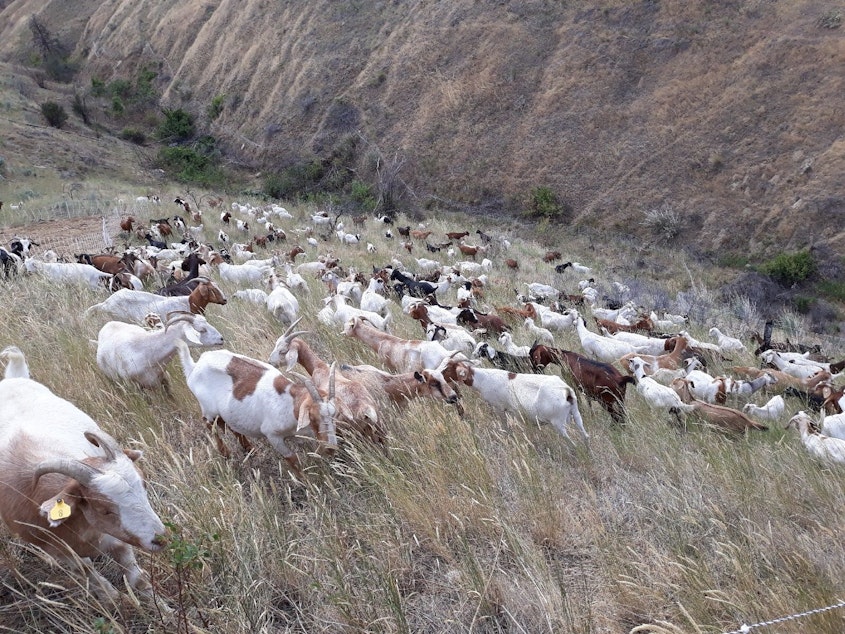
High on the hill was a lonely goatherd. His name was Todd Waits, and along with two working dogs, he was shepherding about 325 goats.
They were there for wildfire prevention. In central Washington, where wildfires rage in August, vegetation has been called “grassoline,” because it feeds eager flames.
The goats call it dinner.
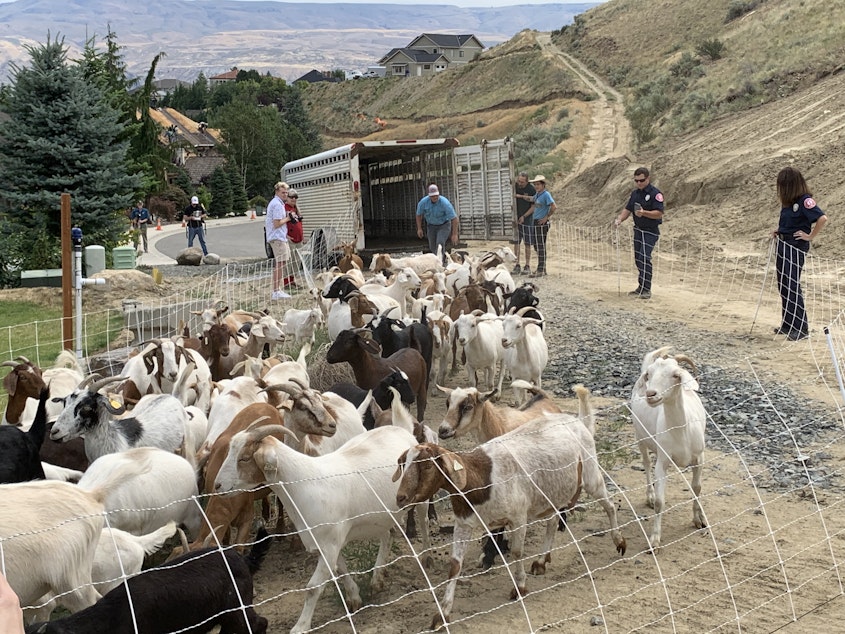
This year Chelan County hired goats to trim back landscape near a Wenatchee neighborhood that was devastated by the Sleepy Hollow Fire in 2015.
According to officials in charge of the pilot, this was the first time goats have been used for wildfire prevention in Washington state. Though it should be noted that there isn't a mechanism to track prevention methods in the state besides oral history, and some say goats have indeed been used before in this capacity.
The animals’ ability to climb hills makes them particularly attractive in Broadview, which abuts a steep area where thinning machines can’t go and prescribed burns are out of the question.
Sponsored

These goats belong to a man named Billy Porter whose company is named, aptly, Billy’s Goats. The goats arrived in Wenatchee by trailer and were released to the hillside, where they mowed through about five acres over the course of 10 days.
The animals are almost magically efficient. They prefer to eat invasive species prone to fire – woody, brushy plants or weeds that are prickly and unpalatable to other livestock. Native, resilient plants are their last choice.
“I accusingly asked the shepherd if he starved them for a week before they let them loose. He said no, this is what they do. They just walk and eat,” said Brian Brett, chief of Chelan County Fire District 1.
It’s not a perfect solution; Brett said the area would likely need reseeding to mitigate erosion caused by grazing and the tramping of thousands of hooves.
Sponsored
It was a balancing act between reducing fire load and preventing overgrazing. As they worked, the goats stayed within a 3-foot-high moveable electric fence. Each day, Porter and Waits moved the penned area.
The fence contains the goats within an area about the size of an acre. It keeps them from running off, but it also keeps them competitive for food, which helps the process.
Chief Brett estimated the goat rental cost about $8,000. It’s just one element of a $400,000 FEMA grant the fire district received to make these homes more defensible to wildfires.
“I haven’t done any calculations to substantiate this, but the way they’ve moved through, and the area they’ve cover, and the difficult slope, and how much fuel there was to reduce – it is the most cost effective measure I could think of employing,” he said.
Hillary Heard, a community wildfire specialist, said using seasonal wildfire staff would be “very, very challenging.”
Sponsored
“It would just take so much manpower,” Heard said.
Heard worked previously in Northern California where goats were used for vegetation management. Washington state has used goats for flood control measures before, but not wildfires.
Click on the photo below to scroll through a slideshow
Sponsored
And what about all that goat manure?
“We haven’t had any complaints whatsoever,” said Brett, the fire chief. “We were concerned with that and the noise and escapees – and no problems. The neighborhood seems to be really happy having them there.”
In fact, the neighbors welcomed them. They watched as herd moved acre by acre. Neighborhood kids played with Junebug, the border collie in charge of herding the goats. And families invited them for meals and helped ice a knee injury of Waits.
Before the goats’ final day, the neighborhood even hosted a dinner. Porter sipped wine while the goats continued their work.
“It’s pretty catastrophic the fires that came through here a few years ago,” Porter said. “I think everyone’s pretty thankful and happy that we’re here.”
Sponsored
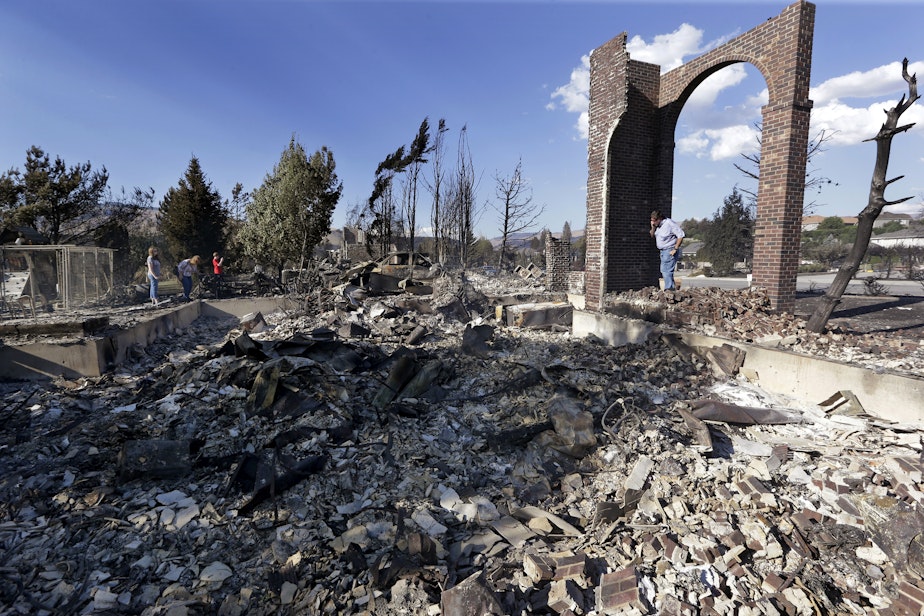

The fire department worked closely with the goats during their stint, helping to re-position the pen and using their brush rigs and fire hose to keep the water troughs full.
The herd consisted of nannies, kids and a few wethers – castrated males. The goats are inquisitive, personable and athletic, Porter said. But they can also be “reckless teenagers.” There was one brief bid for freedom which was rounded up.
“They definitely are escape artists,” Porter said. “As long as there is fresh food in front of them and the fence is hot, usually they’re going to stay in.”
In addition to Junebug, the herd got help from Nanny, a Great Pyrenees mix so named for her occupation. Nanny was the goats’ protector.
And they need protection: Cougars move through this area. Even with a shepherd camping in a trailer on site at all hours, Washington Fish and Wildlife said a dog would help deter a predator from attacking the “walking lawnmowers.”
Half of Chelan County’s residents – about 44,000 people – live in this fire district, which is about 70 square miles. There’s a minimum of eight firefighters on duty spread between four stations to cover the whole area. There’s a contingent of volunteers nearby, but Brett said the numbers are too small.
“We need to take proactive measures,” Brett said. “I think this is going to take off and be very popular based on the effectiveness.”
He said all the conditions for wildfire are ready, just waiting for an ignition source.


